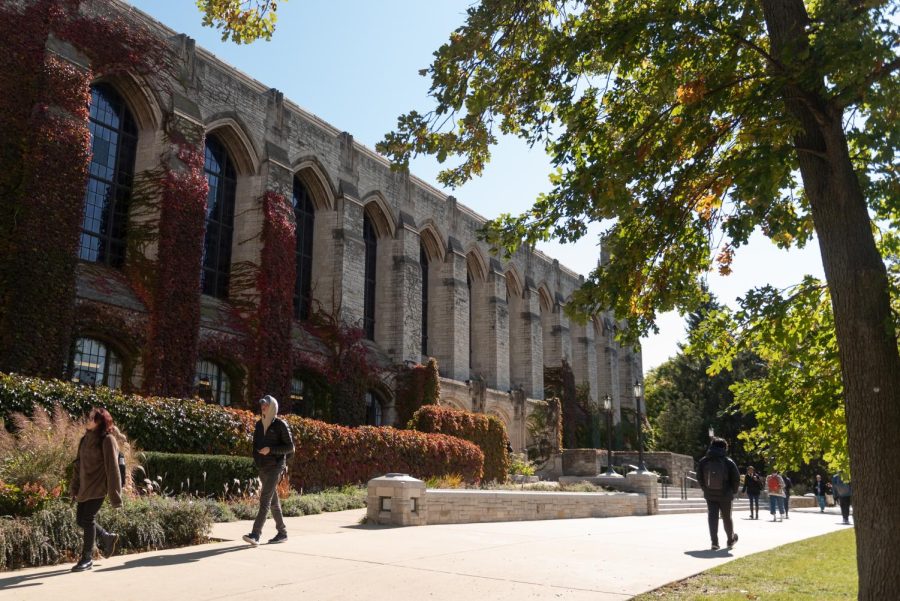A year after going public, library workers reflect on union organizing, bargaining proces
Esther Lim/The Daily Northwestern
Deering Library. Northwestern University Library Workers formally announced its unionization a year ago.
October 21, 2022
After more than two years of organizing — first in secret, then publicly — Northwestern University Library Workers Union is officially in the bargaining process.
A year ago, the Northwestern University Library Workers Union publicly announced its unionization campaign to about 50 people gathered at The Rock. Two months later, the union won its election, gaining formal recognition and kicking off its fight for fair wages and worker protections.
Jamie Carlstone, authority metadata librarian and bargaining committee member, said the University’s treatment of library workers during the pandemic was demoralizing and an impetus for change.
“The union really made all of us feel empowered again, like we could make changes in our workplace and that we could support each other,” Carlstone said.
Five months into the process — which involves regular negotiation meetings between members of the bargaining committee, library management and University administrators — NULWU has worked through most of its non-economic proposals. Bargaining begins with proposals that don’t require the NU to spend money before moving on to the economic proposals, which do call for University funding. For NULWU, non-economic proposals include union rights and meeting standards, among other demands.
STEM librarian Becca Greenstein, a member of the bargaining committee, said she expects the economic proposals to take longer because they require a financial commitment from the University.
“Honestly, if you had asked me a year ago where we’d be, I probably would have said, ‘Oh, we lost. The union-busting campaign was too good.’ I’m an optimist, but I was also very scared,” Greenstein said.
But now Greenstein said she’s hopeful the bargaining committee will be able to achieve some member demands in the contract. Before beginning negotiations, Greenstein said NULWU surveyed members on contract priorities.
The committee works toward tentative agreements each session, which will eventually make it into the final contract that goes up for union vote.
“It’s a totally new way of approaching getting things changed in a workplace, from what I’ve experienced, because it’s just very open,” Carlstone said. “There’s all ranks and groups of people there and the University really has to hear what you’re saying — and not just hear it, but respond to it.”
NULWU’s biggest economic proposal is a wage that keeps up with the cost of living and raises that account for inflation. Bargaining committee members are also pushing for a path to promotion and policy that protects remote work options going forward.
One of the agreements reached by the committee thus far allows workers to receive overtime compensation. Currently, Greenstein said if an employee has to stay late, they “flex their hours” and come in late the next day but get paid the same rate for their late hours. According to the new agreement, workers will be paid time and a half for overtime.
Carlstone said the committee brought a union member to bargaining who had previously experienced this issue to talk directly to administrators and explain why overtime pay matters. She has appreciated being able to uplift her coworkers, even with issues that don’t affect her directly.
Having a union means having a support system, Carlstone said, and NULWU has been able to help workers feel heard and find a place to bring their concerns.
Metadata services workgroup library assistant Daniel von Brighoff said many negotiation meetings have focused on educating the University’s team about workers’ day-to-day realities to explain their demands.
While the bargaining committee has already reached several tentative agreements, von Brighoff said there have also been some challenges. In one instance, he said, the University’s team tried to restrict workers’ ability to participate in demonstrations related to labor, such as NU Graduate Workers’ rally earlier this month.
“Everyone who was there was there on their lunch hour. Nobody was using paid time, and they say, ‘Well, that’s not labor peace, if you join something like that,’” von Brighoff said. “We’re like, ‘How is it not labor peace? We’re not withholding our labor in any way.’”
Labor peace is an agreement by worker organizations to not participate in picketing, stoppages, boycotts or other activities that interfere economically with the institution. Ultimately, von Brighoff said NU’s team agreed to use the Universitywide demonstration policy rather than try to curtail specific demonstrations.
Still, he said the attempt to limit workers’ demonstrations felt indicative of a broader administrative mindset.
“The University really realizes that we’re at this moment now where there’s a huge pro-labor push, and they can’t stop it, but they’re still looking for ways to put the brakes on it where they can,” von Brighoff said. “That, I think, was an attempt on their part to prevent solidarity between different unionization movements on campus.”
Clarification: This story has been updated to more accurately reflect Daniel von Brighoff’s position at Northwestern.
Email: isabelfunk2024@u.northwestern.edu
Twitter: @isabeldfunk
Related Stories:
— Northwestern library workers vote to unionize
— Northwestern University Library Workers Union seeks formal recognition


